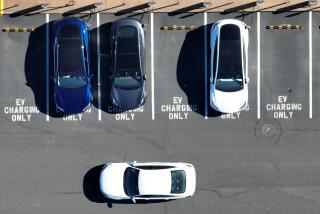World Affairs Council Thinks Globally, Makes Pacts Locally
- Share via
Brazil has acres upon acres of orange trees. Kurt Pidduck has about 15 citrus-tree trimming machines. The two might be a perfect match.
Pidduck, owner of the 35-employee Kimball Toppers Inc. of Santa Paula, will take the first step toward determining the compatibility between his pruning service and the South American nation in an upcoming meeting with representatives from the region.
The trade discussion is expected to take place Dec. 2 at the Westlake Inn, when consuls general and other representatives from about 60 countries will hold private meetings with corporate members of the World Affairs Council of Ventura County. The meetings will be part of a daylong international trade program that will include a presentation by officials of the World Bank.
“We do not at the present time do any international work,” said Pidduck, whose 30-year-old company markets its orange-tree trimming services in California, Florida and Arizona.
“But Brazil is a large market--there’s potential there because of the acreage,” he said. “We’re interested in exploring it and seeing if someone at the other end is interested. . . . These people are the economic attaches, the people charged with the development of business relationships.”
To date, officials from about two dozen of the 80 international consulates based in Los Angeles have agreed to attend the World Affairs Council conference. The list includes Germany, Argentina, Liberia, the PLO, Turkey, New Zealand, Costa Rica, Brazil, Croatia, South Africa and Japan.
Cindy Cooke, executive director of the World Affairs Council, is asking foreign representatives to submit a list of industries with which they would be interested in pursuing partnerships, distributorships, import-export opportunities or other business ties.
New Zealand has shown an interest in the fields of biotechnology, telecommunications, power generation and agriculture. Costa Rica will be concentrating on environmental and computer technology, the aircraft and automotive industries and building and construction. Turkey will focus on the apparel industry, financial investments and utilities.
“High-tech, telecommunications, biotech, environmental tech and agriculture are clusters we are known for,” Cooke said. “We have critical masses of those particular industries.”
Along with the preferences of the countries represented, the council also is asking executives of participating businesses to list the nations with which they would like to meet. The council will then serve as matchmakers.
“Most of the [foreign representatives] have to go to companies one at a time, but this is an opportunity for them to see a lot of people in one place at one time,” Cooke said. “Countries all over the world are looking for the types of technologies that companies in this area have.”
But admittedly, she said, Ventura County often is overlooked when it comes to negotiating a deal with Southern California-based businesses.
“Most of the consuls general don’t come to Ventura County, they go to Orange County,” Cooke said. “Orange County has higher visibility. Obviously Los Angeles County also has higher visibility on the international scene. It’s not that we don’t have business opportunities here--we have tremendous opportunities--it’s just that nobody knows about us.”
Andy Ippolito, consul general of Liberia and secretary of the Los Angeles Consulate Corps, is not among that group. He is well-versed in Ventura County’s areas of business expertise and expects his fellow consuls to learn a lot from their visit to the area.
“You have in Ventura County a diversification of high-tech companies, medium-tech companies and agriculture, so you have a combination of companies that gives the consulate corps a nice mix,” said Ippolito, who plans to attend the conference himself.
Ippolito said he is looking forward to meeting with local business representatives. But of particular interest, he said, is the opportunity to hear what officials of the World Bank have to say.
The World Bank, founded in 1946 to strengthen world markets, is made up of the International Bank for Reconstruction and Development, which makes loans to middle-income developing countries; the International Development Assn., which makes loans to the poorest countries; the International Finance Corp., which makes private-enterprise investments; and the Multilateral Investment Guarantee Agency, which insures against noncommercial risks to foreign private investors.
World Bank officials will discuss the role of their organization at a lunch for World Council corporate members and at a public dinner presentation at the Westlake Inn.
“Basically, the World Bank is an institution that major countries and smaller developing countries look to for financing,” Ippolito said. “This is an opportunity to understand what it is the World Bank is looking for and how countries can meet their qualifications. Liberia is a developing country. How can we best arrange financing? What is it going to take?”
More to Read
Inside the business of entertainment
The Wide Shot brings you news, analysis and insights on everything from streaming wars to production — and what it all means for the future.
You may occasionally receive promotional content from the Los Angeles Times.










